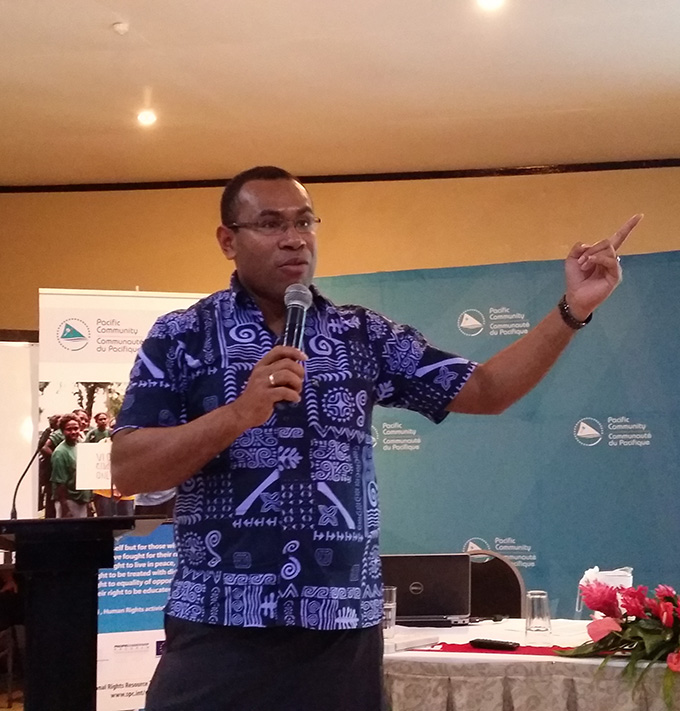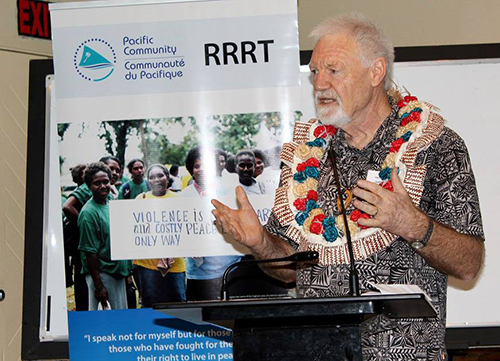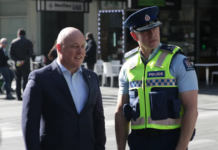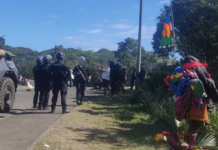
By Margaret Wise of The Fiji Times
Giving voice to the voiceless and championing the rights of all people is essentially about telling the truth.
And that is how journalists in Fiji and the Pacific should approach the ongoing human rights violations happening in West Papua.

This was the key message highlighted by Professor David Robie, journalist, author and director of the Auckland University of Technology’s Pacific Media Centre, as he gave The Fiji Times a sweeping snapshot of issues he thought were important for journalists in the region.
“From a journalist’s point of view, it is a human rights issue,” he said.
He said as far as he was concerned, journalists had a responsibility to cover widely, and as often as they could, West Papua’s call for self-determination — a 50-year plus struggle for liberation from Indonesian occupation.
“They are Pacific. They should never be lost sight of. That is one reason the media in the Pacific should latch on to the significance of this struggle and how important it is to the Pacific.
“For me, the biggest and most staggering human rights issue in the Pacific is West Papua. This has to be a global story.”
‘Untold story’
He said the absence or lack of coverage of this “untold story” had much to do with journalists and editors being unaware and indifferent to a struggle that had persisted for so long.
“The trouble is this all comes back to journalism and telling the truth. If the truth is not being told, how do people respond?
“For some reason many media are also indifferent, they don’t actually realise this is a big story.”
Dr Robie was chief guest at the Human Rights and Media Forum attended last week by senior journalists and government communication officers from 13 Pacific countries.
Supported by the Australian Government and European Union, the forum reaffirmed the vital role of the media in highlighting human rights issues and the importance of news reporting with a human rights-based approach.
Dr Robie said over the past two years there had been a dramatic change to awareness of the plight of West Papua and attributed this to social media, a platform that had allowed the West Papuans to tell their stories themselves, despite the restrictions placed on foreign journalists.
Human rights agencies vary in their estimates of the number of indigenous Papuans who have died since Indonesia first invaded the region – then a Dutch colony – in 1962 and wresting control through the UN-organised “Act of Free Choice” in 1969 widely regarded as a sham. However, a Sydney University academic’s report alleging “secret genocide” estimated 100,000 deaths.
Atrocities evidence
“The West Papuans have been able to get evidence of human rights atrocities in a way that other NGOs and media can pick up and so now through social media the story can be told more widely.”
He said he hoped the Australia and New Zealand media would commit themselves to providing more coverage on the issue.
West Papua is the western half of the island of New Guinea, just 200 km north of Australia.
Over time, Dr Robie said, the West Papua issue could also become a major source of instability in the Pacific as it would have implications across the border with refugees.
He said in countries such as Vanuatu and Papua New Guinea — where citizens were sympathetic — there were West Papua communities already established and exiles were travelling around the region telling their stories.
“So for journalists there are many people there for journalists to interview, to keep the stories alive and tell the truth, any opportunity you get, write the story.”
Dr Robie said it was encouraging that West Papua had achieved observer status in the Melanesian Spearhead Group. With the support of the Solomon Islands, and social media’s ability to push information and supporters to the forefront, he said the region should be ready for some significant changes in media coverage.
Learn from history
Political leaders, he said, should also learn from history.
“East Timor’s invasion was treated like a lost cause. The media saw it largely as a non-issue because governments recognised the sovereignty of the Indonesian government, even though it was invaded illegally.
“People used to say East Timor would never be independent but 24 years later it did, at a terrible cost.
“It’s a lesson for us. Somehow we don’t learn from history. Because if it happened in East Timor then hope should not be lost for West Papua.
“Unfortunately political leaders are a long way behind the reality of what is happening.
“It’s a real important story for Pacific journalists. Human rights is beyond trade. Human rights should actually override trade. Many countries in the world turned their backs on a major human rights violation. Human rights violations is the main issue that the story should be told from.
“Ultimately, history will move on and the leaders that don’t recognise this now will be exposed in time. West Papua coverage is in the context of human rights issues and the accountability processes, there is no accountability in a whole range of areas. Through social media more people are asking questions and there is more debate and discussions about the situation in West Papua.”
Dr Robie said as credible sources, churches were critically important to discussions on West Papua.
He said fortunately, through the commitment of leaders and researchers, the churches had been generally able to publicise reports in a systematic way.
The forum was organised by the Regional Rights Resource Team (RRRT) of the Pacific Community (SPC) in partnership with the Pacific Media Assistance Scheme (PACMAS), the Pacific Islands News Association (PINA) and the University of the South Pacific (USP) Journalism Programme.
HUMAN RIGHTS AND MEDIA FORUM
Human rights violations blamed on silence and ‘looking the other way’
Pacific journalists make human rights for the ‘voiceless’
Regional Rights Resource Team (RRRT)
Reporters urged to be gender sensitive











































